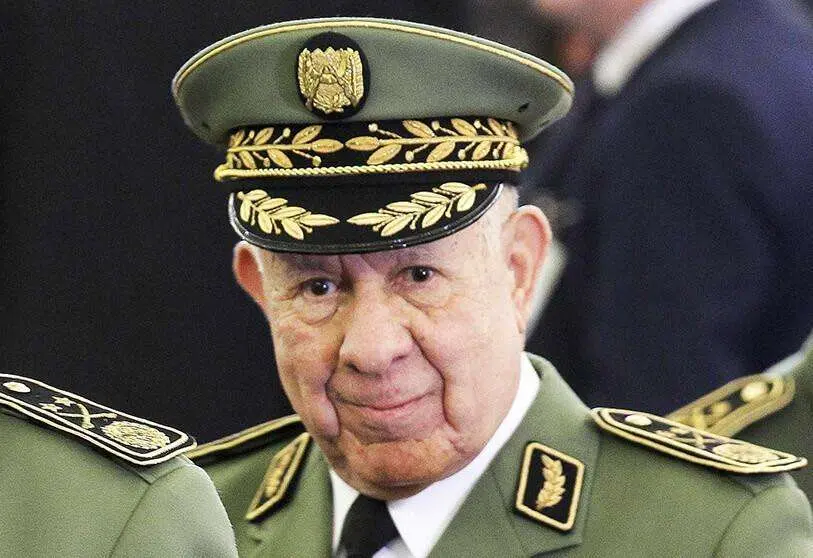El jefe del Estado Mayor de Argelia mantiene su postura ante “el acecho marroquí”

The chief of staff is the de facto commander of the army in Algeria, as President Abdelmajid Tebboune holds the post of Defence Minister according to the constitution. Said Chengriha took office in December 2019, following the death of his predecessor, Lieutenant General Ahmed Gaïd Salah, who played a major role in the late Algerian president Abdelaziz Bouteflika's resignation from office following popular protests against him. During the meeting he stressed that the Algerian people are united with their army and security forces, and are aware of who is behind these despicable plans and can thwart them, adding that the army "will cut off the hands of all those who meddle an inch in the country, or seek to violate the sanctity of its national sovereignty".
Tension has reigned in Algeria's relationship with the neighbouring Kingdom of Morocco since the 1990s. The land borders between the two countries have been closed since 1994 due to Morocco's imposition of entry visas for Algerians following the bombing of the Hotel Asni in Marrakech, an attack for which the Moroccan authorities blamed the Algerians. The attack was carried out by the French-Algerian Islamist group "Kelkal", who at the time carried out continuous attacks in the cities of Casablanca and Fez. The two countries are also on opposite sides of the Moroccan Sahara issue, as Algeria supports the Polisario Front and opposes Moroccan sovereignty over the territory.

Since 24 August 2021, Algeria has severed all diplomatic relations with Morocco in response to an alleged spying scandal by the Alawite country coupled with discontent over the normalisation of relations with Israel expressed in 2020. Diplomatic relations between Algeria and Morocco refer to the series of bilateral relations that have coexisted between the independent Kingdom of Morocco in 1956 and first the Algerian National Liberation Front, which Moroccan King Mohammed V supported with money, arms and medicines, and then the Algerian Democratic and Popular Republic, once Algeria gained its independence in 1962. Morocco has been represented in Algeria by an embassy and consulate in Algiers, as well as two consulates in Oran and Sidi Bel Abbès; Algeria has been represented in Morocco by a consulate general in Rabat, and two consulates in Casablanca and Oujda.
If there is one country where Islamic terrorism is a concern, it is Algeria, in part because of the three-way guerrilla war that raged through the country during what is known as the 'Black Decade'. The Algerian civil war, also known as the "Decade of Terrorism", or the Years of Lead, was an armed conflict between the Algerian government and various Islamist rebel groups that began in late 1991 and was progressively winding down between 1999 and 2002. The clashes between the government and Salafist and Islamist groups left more than 150,000 people dead in the country, causing panic among the population and the political establishment, which, since 1999 with the rise to power of the late former president Abdelaziz Bouteflika, has been on a war footing against terrorism in all its facets.

Chengriha explained that extremism is a historical phenomenon characterised by transformation and complexity, and that it takes different expressive forms, and is based on different intellectual and ideological premises, according to time and place, indicating that it shares some principles based on the misconception of appropriating the truth, rejecting the other and adopting expressive behaviour through discourse, or acts based on hatred, or even violence that can amount to terrorism. He noted that Algeria has been suffering for a decade from the "scourge of intrusive terrorism", which threatens the pillars of the country and its republican system, the security and harmony of society, the cohesion of its identity and ruins its economy.
Lieutenant General Said Chengriha, chief of the Algerian General Staff, issued strong warnings against what he called "stalking in Algeria" to which he added: "It seems that this positive movement known to our country did not please the enemies of the peoples and their agents (he did not name them), and made them lose their heads, as they started to mobilise their media spokesmen and some paid pens, with the aim of damaging Algeria's reputation, attacking its institutions and questioning its historical and geographical foundations". The Algerian Chief of Staff went on to say, "Indeed, these polemics have gone beyond a limit that cannot be tolerated, especially when it comes to our national sovereignty and territorial integrity, for which millions of just martyrs were sacrificed" in reference to the controversial map published by MarocHebdo where part of Algeria's national territory was depicted as Moroccan land.

On the other hand, the Algerian Ministry of Defence announced in its weekly report that a terrorist named "Meluki Hayeballah" surrendered to the military authorities in the area of Bordj Badji Mokhtar, in the south of the country, where he had been militating among terrorist groups in the Sahel region for 11 years, and was in possession of an automatic rifle, a Kalashnikov. Four elements supporting terrorist groups were also seized in separate operations throughout the country over the last few weeks.








